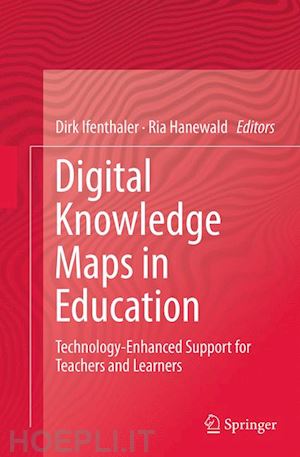
Questo prodotto usufruisce delle SPEDIZIONI GRATIS
selezionando l'opzione Corriere Veloce in fase di ordine.
Pagabile anche con Carta della cultura giovani e del merito, 18App Bonus Cultura e Carta del Docente
Digital knowledge maps are ‘at a glance’ visual representations that enable enriching, imaginative and transformative ways for teaching and learning, with the potential to enhance positive educational outcomes. The use of such maps has generated much attention and interest among tertiary education practitioners and researchers over the last few years as higher education institutions around the world begin to invest heavily into new technologies designed to provide online spaces within which to build resources and conduct activities. The key elements of this edited volume will comprise original and innovative contributions to existing scholarship in this field, with examples of pedagogical possibilities as they are currently practiced across a range of contexts. It will contain chapters that address, theory, research and practical issues related to the use of digital knowledge maps in all aspects of tertiary education and draws predominantly on international perspectives with a diverse group of invited contributors. Reports on empirical studies as well as theoretical/conceptual chapters that engage deeply with pertinent questions and issues raised from a pedagogical, social, cultural, philosophical, and/or ethical standpoint are included. Systematic literature reviews dealing with digital knowledge mapping in education are also an integral part of the volume.
PART I- Digital Knowledge Maps in Open, Distance, and Flexible Learning Contexts.- Chapter 1 – Digital Knowledge Mapping In Educational Contexts.- Chapter 2 - Making Sense Of Knowledge Integration Maps.- Chapter 3 - Concept Maps For Comprehension And Navigation Of Hypertexts.- Chapter 4 - Using Digital Knowledge Maps For Supporting Tutors Giving Effective Explanations.- Chapter 5 - Investigating Through Concept Mapping Pre-Service Teachers’ Thinking Progression About ‘Elearning’ And Its Integration Into Teaching.- Chapter 6 – Concept Mapping In Graduate Education.- PART II – Digital Knowledge Maps in Collaborative Learning Contexts.- Chapter 7 - Collaborative Work With Digital Knowledge Maps On Improving Esl Learners’ Reading Skills.- Chapter 8 - Researching Individual And Collaborative Pair Learning In Primary School Students Using Digital Knowledge Maps For Science Education.- Chapter 9 - Towards A Cultural-Historical Theory Of Knowledge Mapping: Collaboration And Activity In The Zone Of Proximal Development.- Chapter 10 - Developing Australian Undergraduate Students’science Communication Skills Through Collaboratively Created Digital Knowledge Maps.- Chapter 11 - Using Novakian Concept Maps To Foster Peer Collaboration In Higher Education.- PART III – Advances in Assessment Using Digital Knowledge Maps.-Chapter 12 - Assessment For Learning Using Digital Knowledge Maps.- Chapter 13 - Sequentially Analyzing And Modeling Causal Mapping Processes That Support Causal Understanding And Systems Thinking.- Chapter 14 - Gainfully Guided Misconception - How Automatically Generated Knowledge Maps can Help Companies Within and Across Their Projects.- Chapter 15 - Digital Concept Mapping for Formative Assessment.- Chapter 16 - Digital Knowledge Maps: The Foundation For Learning Analytics Through Instructional Games.- PART IV – Case Studies Investigating Digital Knowledge Maps.- Chapter 17 - Digital Knowledge Mapping AsAn Instructional Strategy To Enhance Knowledge Convergence – A Case Study.- Chapter 18 - Shared Cognitions In A Field Of Informal Education - Knowledge Maps Towards Money Management Of Young Adults.- Chapter 19 - Predispositions To Concept Mapping: Case Studies Of Four Disciplines In Higher Education.











Il sito utilizza cookie ed altri strumenti di tracciamento che raccolgono informazioni dal dispositivo dell’utente. Oltre ai cookie tecnici ed analitici aggregati, strettamente necessari per il funzionamento di questo sito web, previo consenso dell’utente possono essere installati cookie di profilazione e marketing e cookie dei social media. Cliccando su “Accetto tutti i cookie” saranno attivate tutte le categorie di cookie. Per accettare solo deterninate categorie di cookie, cliccare invece su “Impostazioni cookie”. Chiudendo il banner o continuando a navigare saranno installati solo cookie tecnici. Per maggiori dettagli, consultare la Cookie Policy.